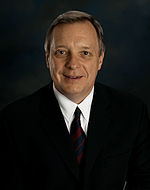United States Senate Minority Leader
| Majority Leader of the U.S. Senate |
|
|---|---|
| Style | Leader |
| Inaugural holder | Henry Cabot Lodge (R) |
| Formation | April 27, 1920 |
| Minority Leader of the U.S. Senate |
|
|---|---|
| Style | Leader |
| Inaugural holder | Oscar Underwood (D) |
| Formation | March 4, 1920 |
| Majority Whip of the U.S. Senate |
|
|---|---|
| Style | Whip |
| Inaugural holder | J. Hamilton Lewis (D) |
| Formation | 1915 |
| Minority Whip of the U.S. Senate |
|
|---|---|
| Style | Whip |
| Inaugural holder | James Wadsworth, Jr. (R) |
| Formation | 1913 |
The Senate Majority and Minority Leaders are two United States Senators and members of the party leadership of the United States Senate. These leaders serve as the chief Senate spokespeople for the political parties respectively holding the majority and the minority in the United States Senate, and manage and schedule the legislative and executive business of the Senate. They are elected to their positions in the Senate by their respective party caucuses, the Senate Democratic Caucus and the Senate Republican Conference.
By rule, the Presiding Officer gives the Majority Leader priority in obtaining recognition to speak on the floor of the Senate. The Majority Leader customarily serves as the chief representative of their party in Senate, and sometimes even in all of Congress if the House of Representatives and thus the office of Speaker of the House is controlled by the opposition party.
The Assistant Majority and Minority Leaders of the United States Senate (commonly called Senate Majority and Minority Whips) are the second-ranking members of each party's leadership. The main function of the Majority and Minority Whips is to gather votes on major issues. Because they are the second ranking member of the Senate, if there is no floor leader present, the whip may become acting floor leader. Before 1969, the official titles were Majority Whip and Minority Whip.
The Senate is currently composed of 52 Republicans, 46 Democrats, and 2 independents, both of whom caucus with the Democrats.
...
Wikipedia




